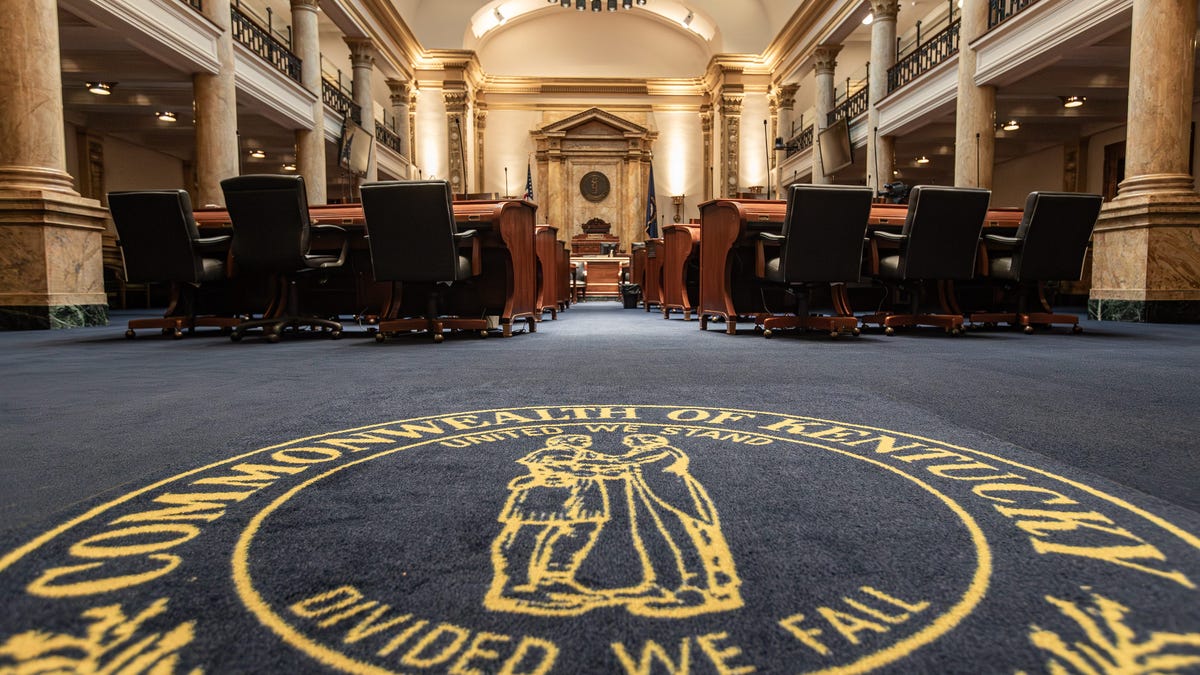Kentucky
Kentucky Allowed to Enforce Trans Care Ban, Appeals Court Rules

The U.S. Court of Appeals for the Sixth Circuit has again allowed a ban on gender-affirming care for trans youth to be enforced.
The ruling came Monday in a case out of Kentucky. The same three-judge panel of the court had ruled similarly in a case from Tennessee, making the Sixth Circuit the first court to decide in favor of any gender-affirming care ban.
In the Kentucky case, a lower court had issued an injunction in June blocking the ban from enforcement while a lawsuit against it proceeds. But the judge in that case, U.S. District Judge David Hale, lifted the injunction in July after the Sixth Circuit ruled that Tennessee’s ban could go into effect. The Sixth Circuit covers Tennessee, Kentucky, Ohio, and Michigan. The seven trans minors and their parents who had sued over the ban filed an emergency motion with the appeals court to have the injunction reinstated.
But Judges Jeffrey Sutton and Amul Thapar, who had ruled that Tennessee’s ban could be enforced while the suit against it is heard, did the same for the Kentucky law. Judge Helene White dissented in both cases.
Sutton and Thapar held that those challenging the Kentucky ban are unlikely to prove that it violates the constitutional rights to due process and equal protection of the laws. They noted that the young people affected by the ban are given time to wean off puberty blockers and hormones, which they said lessens the harm done by the law. However, in Kentucky the law requires the weaning period to begin immediately, while Tennessee gives doctors and patients until next year to start it. This did not make a difference to the judges, though.
In Kentucky, unlike in Tennessee, some state officials disagree with the ban, and the judges recognized this, but this did not make a difference to the judges either; they said the state has the same interest in making and enforcing its laws.
Kentucky legislators passed the ban over Democratic Gov. Andy Beshear’s veto in May. It was part of a broad anti-LGBTQ+ bill that also bars public schools from teaching about sexual orientation and gender identity, restricts restroom use by trans students, and requires school personnel to out LGBTQ+ youth to their parents.
White, in her dissent, contended that the plaintiffs are likely to succeed on their constitutional claims. In addition, the fact that Kentucky trans youth must begin weaning immediately makes it more likely that they will suffer harm, she wrote. “I would lift the stay [of the injunction] at least with regard to those who were undergoing the now-banned treatments when the law took effect,” she explained.
The Kentucky case is known as known as Doe v. Thornbury. The plaintiffs are represented by the American Civil Liberties Union of Kentucky, the National Center for Lesbian Rights, and Morgan, Lewis & Bockius LLP. The Advocate has sought comment from the lawyers but has yet to receive a response.
The Sixth Circuit court is one of the most conservative appeals courts in the nation. If it and other courts eventually rule differently on whether bans on gender-affirming care are unconstitutional, it could result in a case going to the U.S. Supreme Court. The high court’s 2015 ruling in favor of marriage equality in Obergefell v. Hodges came in a case out of the Sixth Circuit.
Gender-affirming care bans have been temporarily blocked (while cases are heard) in Alabama, Florida, and Indiana because federal judges believed that those who are challenging them are likely to prove unconstitutional discrimination, and a judge in Arkansas has gone further by striking down that state’s law, the first ruling on such a law’s merits. In a suit in Oklahoma, the state and the challengers have agreed that the law will not be enforced while the case proceeds.

Kentucky
At least 25 dead as tornadoes and thunderstorms devastate parts of Kentucky, Missouri

At least 25 people have perished in severe weather that swept across Missouri and Kentucky over the weekend, authorities said.
Kentucky Gov. Andy Beshear said the number of weather-related fatalities — he attributed them to a single tornado initially believed to have touched down at EF3 strength overnight — had risen from 14 to 18 by late Saturday afternoon.
“It has taken far too many lives,” Beshear said. “Homes that there isn’t a single wall standing. Homes that have all four walls yet lost the person inside.”
The governor said 17 of the fatalities were in Laurel County and one was in Pulaski County. One of the deceased was a Laurel County firefighter, Beshear said.
Officials in Missouri reported seven weather-related fatalities since Friday, including five in St. Louis County and two in Scott County.
Beshear vowed that the state’s resources are being deployed to help Kentuckians affected by the severe weather. He said 10 people remained in critical condition after suffering weather-related injuries in Kentucky.
A spokesperson for St. Louis Children’s Hospital and Barnes-Jewish Hospital in St. Louis, Missouri, said the facilities received over 60 patients in total, with the children’s facility treating 15 and Barnes-Jewish seeing more than 50. Two of the patients at Children’s Hospital were in critical condition. All others have been discharged, the spokesperson said on Saturday.
Most of the patients at Barnes-Jewish have been discharged or will be soon, the spokesperson said.
St. Louis Mayor Cara Spencer said the severe weather, including two reported tornadoes in the area on Friday, affected an estimated 5,000 buildings in the city.
Homeland Security Secretary Kristi Noem said in a statement Saturday that she has spoken with the governors of Missouri, Kentucky and Illinois and offered them “federal resources and action for the deadly tornadoes and storms.”
“We discussed how while emergency management is best led by local authorities, we reinforced that DHS stands ready to take immediate action to offer resources and support,” Noem said.
The severe weather was the result of an east-moving system of unstable air set off by a clash of warmth to the south and west and a cooler front to the north, federal forecasters said.
The National Weather Service said 28 tornadoes were reported on Friday.
More than 63,000 utility customers in Missouri and 58,000 in Kentucky were without power on Saturday, according to utility tracker PowerOutage.us.
Kentucky
PHOTOS: Storm, tornado damage seen across Kentucky

(LEX 18) — Severe storms seen across the Commonwealth Friday evening into early Saturday morning have left with it a trail of debris and damage.
See below the photos of the damage, including the aftermath of a tornado in Somerset, submitted to LEX 18,
Kentucky
Will Kentucky have Medicaid work requirements? What the state is planning under new law

Facts About the Kentucky General Assembly
Discover key facts about the Kentucky General Assembly, including its history, structure, and state government functions.
- Kentucky plans to implement new Medicaid work requirements for certain “able-bodied” adults.
- The program aims to connect recipients with job placement assistance, education, and training.
- Approximately 75,000 Medicaid expansion recipients are estimated to be affected.
- The state anticipates $184 million in Medicaid savings over five years.
Kentucky officials laid out how they plan to enact new Medicaid requirements in a public notice published May 13.
According to the notice, the state’s Department for Medicaid Services is seeking federal approval to implement a community engagement waiver program, with the goal of supporting “individuals in gaining economic stability” by connecting them to educational and job assistance programs.
The request comes after the Kentucky General Assembly passed a bill during the 2025 legislative session that requires some “able-bodied adults” to participate in such a program, after being approved and established by the Cabinet for Health and Family Services.
It also comes amid discussion of work requirements for Medicaid recipients nationally, with House Republicans proposing changes to the program as they attempt to reduce billions in spending.
Here’s what to know about the state’s proposal.
Who would be required to participate in Kentucky’s community engagement waiver program?
According to the public notice, the program would apply to adults in the state’s Medicaid expansion, who have been enrolled for more than 12 months and:
- Are between 19 and 60 years old;
- Are physically and mentally able to work, as defined by the Cabinet for Health and Family Services;
- Are not primarily responsible for the care of a dependent child or disabled adult relative.
Who could be exempt from Kentucky’s program?
The notice states the Department for Medicaid Services will review members for possible exemptions and will not require participation for those who meet one or more criteria, including:
- People with diagnosed substance use disorder or serious mental illness;
- People with a chronic disease or acute medical condition that prevents them from complying with requirements;
- People who have been deemed disabled;
- People with verified earned income or who receive unemployment insurance;
- Pregnant women;
- People who are victims of domestic violence;
- People who are homeless or were recently homeless;
- People who have recently been impacted by a catastrophic event, such as a natural disaster or death of a family member in their household;
- Former foster youth up to age 26.
How will Kentucky’s community engagement waiver program work?
Under the proposal, the Department for Medicaid Services will refer eligible adults to the Kentucky Education and Labor Cabinet’s Department of Workforce Development.
That department will then reach out to members with available job placement assistance programs.
“For individuals who agree to receive support, DWD will connect them with supports such as apprenticeships, career development, education, employment and training, and will provide support in preparing them to enter the workforce, advance their careers, improve job performance, and fill skills gaps,” the notice states.
How many people are expected to be eligible for the program?
The public notice estimates around 75,000 people will be “subject to the requirements of this waiver.”
About 488,000 people were covered by Kentucky’s Medicaid expansion as of 2024, according to federal data.
Officials expect “a minimal impact to enrollment” as recipients “are able to identify gainful employment through the community engagement process and therefore are no longer eligible for Medicaid,” the notice states.
How could the program effect spending on Medicaid?
Kentucky officials expect to spend less on Medicaid as expansion recipients gain employment through the community engagement waiver program.
According to the notice, the state expects to spend $184 million less over five years than it would without the program.
Why is Kentucky seeking a community engagement waiver program?
Earlier this year, lawmakers passed House Bill 695, which made sweeping changes to the state’s Medicaid program.
That included the controversial requirement for able-bodied adults to participate in a community engagement waiver program, including potentially requiring recipients to work 20 hours per week.
The bill drew widespread support from Republicans and criticism from Democrats. Critics of work requirements say they’re “another way to cut coverage,” while supporters say it “demands that those who can put forth the effort do.”
A similar measure was previously introduced by former Gov. Matt Bevin in 2018, which would have required able-bodied adults to work or volunteer at least 20 hours a week or facing losing health coverage. That decision drew a lawsuit from health law advocates, and Bevin’s proposal was eventually blocked by a federal judge.
How can Kentuckians have input in the program?
The Department for Medicaid Services will hold two public forums on the program, one virtually and another in person.
The virtual forum will take place at 10 a.m. May 22. Find information for the call in the public notice at chfs.ky.gov/agencies/dms/Pages/Medicaid-SUD-1115-Waiver.aspx.
An in-person forum will take place at 10 a.m. May 23 at the Kentucky Transportation Cabinet auditorium at 200 Mero St. in Frankfort.
Public comments can also be submitted by June 12 by email to KY1115CommEngagement@mslc.com or by mail to Kentucky Medicaid Section 1115 Comment, c/o DMS Commissioner’s Office, 275 E. Main St. 6W-A, Frankfort, KY 40621.
Reach reporter Hannah Pinski at hpinski@courier-journal.com or follow her on X, formerly known as Twitter, at @hannahpinski.
-

 Austin, TX1 week ago
Austin, TX1 week agoBest Austin Salads – 15 Food Places For Good Greens!
-

 Technology1 week ago
Technology1 week agoNetflix is removing Black Mirror: Bandersnatch
-

 World1 week ago
World1 week agoThe Take: Can India and Pakistan avoid a fourth war over Kashmir?
-

 News1 week ago
News1 week agoReincarnated by A.I., Arizona Man Forgives His Killer at Sentencing
-

 News1 week ago
News1 week agoWho is the new Pope Leo XIV and what are his views?
-

 News1 week ago
News1 week agoEfforts Grow to Thwart mRNA Therapies as RFK Jr. Pushes Vaccine Wariness
-

 Entertainment1 week ago
Entertainment1 week agoReview: 'Forever' is a sweet ode to first love (and L.A.) based on Judy Blume's novel
-

 Politics1 week ago
Politics1 week agoDepartment of Justice opens criminal investigation into NY AG Letitia James



















